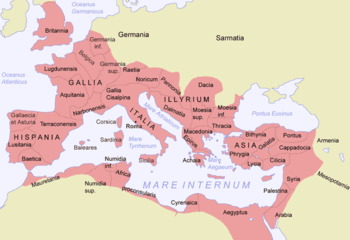Roman Times Quarterly
From NovaRoma
(Difference between revisions)
m |
|||
| (10 intermediate revisions by 3 users not shown) | |||
| Line 1: | Line 1: | ||
[[Image:rtspubheader01.png|center]] | [[Image:rtspubheader01.png|center]] | ||
| − | + | __NOTOC__ | |
| Line 17: | Line 17: | ||
{{sectionheaderrtq|In The Current Issue...}} | {{sectionheaderrtq|In The Current Issue...}} | ||
| − | + | <!-- | |
| − | + | ||
| − | * | + | * '''Aphrodisias''': The cult of Aphrodite, a Greek goddess of fertility, love, and nature was a popular goddess in antiquity, and there were many sanctuaries dedicated to her and her followers. One such was the city of Aphrodisias in Turkey. The city can be found to the southeast of the ancient city of Smyrna (modern Izmir). The city is located nearly 600 metres... |
---- | ---- | ||
| − | * | + | * '''HISTORY OF GASTRONOMY IN THE WEST''': The first significant step toward the development of gastronomy was the use of fire by primitive man. To cook his food, which gave rise to the first meals as families gathered around the fire to share the foods that they had cooked. Prehistoric cave paintings such... |
---- | ---- | ||
| − | * | + | * '''Eclipse, Occulation and Transit''': The historian Thucydides comments on the frequency of eclipses during the Peloponnesian War, which began in 431 B.C. and lasted for 27 years. The most interesting of these was a solar eclipse that occurred in the summer of the first year of the war (calculated date; August 27, 413 B.C.) |
---- | ---- | ||
| − | * | + | * '''Ethics #1''': The study and pursuit of ethics is an interesting one. In regard to Socrates and ethics, by conventional standards, he was certainly guilty... |
---- | ---- | ||
| − | + | ||
| − | + | --> | |
| + | |||
| + | Read more in [http://novaroma.org/vici/images/RomanTimesQuarterly2008-4.pdf Roman Times Quarterly, 4th Quarter, 2761 a.U.c. (2008 CE)] (in PDF format). | ||
| + | |||
|width="2%" valign="top"| | |width="2%" valign="top"| | ||
| Line 38: | Line 41: | ||
'''Have an interesting aricle or series you would like to share with others on ancient Rome?''' Send us your works for preview for inclusion in the next issue of the RTQ today! Inquiries and contributions for publication consideration may be sent to this webzine via the Editor at: '''jmath669642reng@webtv.net''' | '''Have an interesting aricle or series you would like to share with others on ancient Rome?''' Send us your works for preview for inclusion in the next issue of the RTQ today! Inquiries and contributions for publication consideration may be sent to this webzine via the Editor at: '''jmath669642reng@webtv.net''' | ||
---- | ---- | ||
| − | Senior Editor: Senator Marcus Audens | + | Senior Editor: '''[[Marcus Minucius Audens (Nova Roma)|Senator Marcus Audens]]''' |
{{sectionheaderrtq|Past Issues}} | {{sectionheaderrtq|Past Issues}} | ||
| + | * [[Roman_Times_Quarterly/2008.3|3rd Quarter, 2761 a.U.c. (2008 CE)]] | ||
| + | * [[Roman_Times_Quarterly/2008.2|2nd Quarter, 2761 a.U.c. (2008 CE)]] | ||
| + | * [[Roman_Times_Quarterly/2008.1|1st Quarter, 2761 a.U.c. (2008 CE)]] | ||
* [http://www.livinghistoryengineer.com/roman/RomanTimesQuarterly/index.htm Click Here] for previous online editions. | * [http://www.livinghistoryengineer.com/roman/RomanTimesQuarterly/index.htm Click Here] for previous online editions. | ||
---- | ---- | ||
| − | |||
| − | |||
| − | |||
[[Image:RTQRomanEmpireMap.png|thumb|center|350px|The Roman Empire reached its greatest extent in the year 116]] | [[Image:RTQRomanEmpireMap.png|thumb|center|350px|The Roman Empire reached its greatest extent in the year 116]] | ||
| + | |||
| + | |||
| + | |||
| + | [[Category:Publications]] | ||
Latest revision as of 00:14, 17 January 2009
|
Welcome to the Roman Times Quarterly Webzine!
Roman Times Quarterly is a publication providing insight on the very best of ancient Roman life.
| ||
|
In The Current Issue...
|
|
From the Editor's Desk Have an interesting aricle or series you would like to share with others on ancient Rome? Send us your works for preview for inclusion in the next issue of the RTQ today! Inquiries and contributions for publication consideration may be sent to this webzine via the Editor at: jmath669642reng@webtv.net Senior Editor: Senator Marcus Audens
Past Issues
|

